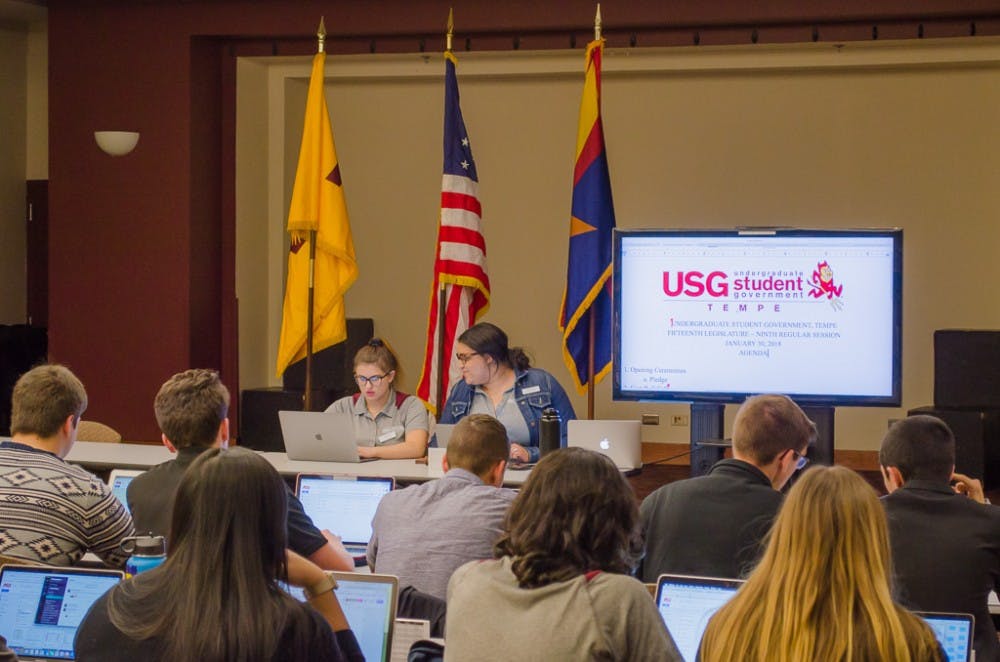The Undergraduate Student Government Tempe senate unanimously passed a resolution that calls on ASU to adopt a medical amnesty program, seeking to prioritize students' health and safety in potentially life-threatening situations involving illegal substances.
Senate Resolution 11, which was passed during the senate's regular session meeting on March 26, asks for the University to grant amnesty to students who call for medical assistance in a situation involving drugs or alcohol, so students are not discouraged from calling for help out of fear they will be punished for possessing the substances.
Currently, ASU prohibits the possession or consumption of alcohol on campus, including campus housing, except for during events that have received prior approval from the Arizona Board of Regents. ASU also prohibits the use of illegal substances and the misuse of controlled substances.
According to the ASU Student Services Manual, "sanctions are imposed on a student who violates a Board of Regents’ or University drug or alcohol policy," including possible suspension, expulsion or admittance into a drug education or assessment program.
The idea for the resolution was brought to sponsor Ryan Magel by the ASU Students for Sensible Drug Policy.
Students for Sensible Drug Policy has been advocating for years for this medical amnesty policy, also known as a good Samaritan policy, according to club president Maya Tatum.
Tatum, a senior double majoring in justice studies and African American studies, said that the purpose of the resolution is not to take a stance on overall drug usage, but to help students who are struggling and in a possibly life-threatening situation.
"I strongly believe that we should value the lives of our students over the one too many beers they had," she said. "Because ultimately, someone is unable to learn a lesson if they’re dead."
Tatum said that the club's goal is to reduce the harm associated with drug use by removing restrictions that may impede someone from seeking help.
"The idea of harm reduction is that you meet people where they are at and provide them with services rather than placing restrictions and limitations on what they can do as far as bettering themselves," she said.
Magel, a USGT senator for the College of Liberal Arts and Sciences and a junior majoring in political science, said he was surprised that the University did not already have such a policy in place.
"As a university, we take fundamental responsibility for the community we serve," he wrote in an email. "By punishing those who aim to do the same, regardless of the situation, we are failing to uphold our charter."
Although medical amnesty is not ASU’s current policy, the University said it shares the goal of helping students who are in need of medical assistance due to alcohol or drug consumption.
"Our goal in responding to any issue involving the over-consumption of alcohol or other substances is to get immediate help for the student in need," a University spokesperson said via email. "We share USG’s desire to remove any barriers for students seeking assistance and will work with ASU’s student leadership to better understand their desire for an amnesty policy."
Going forward, Tatum said that she hopes the resolution motivates USG branches on other campuses to pass similar ones to show unified support for a medical amnesty policy.
"I hope that because the Tempe campus has passed it, it will inspire the Polytechnic, the Downtown, and the West campuses to also pass the resolution," she said. "Once they have done so, we can go and present the actual policy, the language of a good Samaritan policy to the Arizona Board of Regents."
Magel said in an emailed statement that he will continue to work with other USG officials to see that this resolution is passed on the other campuses, as well as take this resolution to politicians who can help make it a reality.
"I am working with senators on the other campuses to pass similar resolutions, (and we) will be following up with administration, and plan on reaching out to various city and state level politicians to help save lives not just at ASU but all across Arizona," he wrote in the email.
“We have to do whatever it takes to protect each other," Magel said.
Reach the reporter at krquaran@asu.edu and follow @kiaraquaranta on Twitter.
Like The State Press on Facebook and follow @statepress on Twitter.




